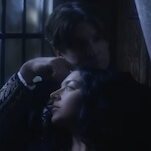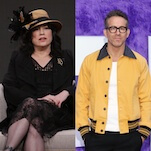What The Walking Dead’s optimism reveals about Game Of Thrones’ cynicism

There’s a great scene in Tomorrowland where a character suggests we’re placating fears about our impending doom by channeling them into easily consumable apocalyptic entertainment. At first glance, that description seems to fit both Game Of Thrones and The Walking Dead, two bloody, brutal, incredibly popular shows prone to killing off beloved characters in horrific ways (and sometimes bringing them back from the dead). But despite their similarities—which also include frequent zombie attacks—I argue they use their violent worlds to very different ends: Game Of Thrones is a deeply cynical portrait of medieval society while The Walking Dead is a surprisingly optimistic vision of the apocalypse.
Of course, an optimistic show isn’t inherently better than a cynical one or vice versa. In fact, Game Of Thrones is objectively the better written, better acted series and its cynicism is a crucial part of its success. But the two shows’ tonal differences explain why I have such a hard time connecting to Game Of Thrones even though I love The Walking Dead. I’ve always been the kind of person who prefers Star Trek’s optimism to Battlestar Galactica’s pessimism, and the same sort of dichotomy is happening here too, even if it’s harder to spot.
In fact, it probably sounds slightly insane to call The Walking Dead optimistic, given that there’s an element of “tune in to see who dies” baked into its premise. And on paper it might even seem like the more cynical of the two shows since it’s set during a literal apocalypse while Game Of Thrones takes place in a civilized word. But it’s precisely those settings that give the shows their drastically different ideologies: It’s a given that a zombie apocalypse would be bad. It’s jarring to suggest a society could be worse.
The basic idea of John Locke’s social contract is that societies exist because people choose to exchange personal freedom for protection. But despite living in a “civilized” world, the characters on Game Of Thrones have neither freedom nor protection. The show asserts that social stability is, to some extent, a lie. The country’s leaders—even the “good” ones like Ned and Robb—are often too caught up in personal politics to actually rule. Daenerys is the only leader who regularly talks about the people she’s serving, and to some extent she’s created as much chaos as stability for them. And the show regularly subverts fantasy tropes by killing off traditionally heroic figures—most famously Ned Stark—and letting ruthless characters flourish, which makes for both good drama and a decidedly dark take on politics.
Though The Walking Dead occasionally tries to paint its heroes in similar shades of gray—particularly when it pushes Rick to dark places—there’s not actually much nuance to its good vs. bad dichotomy. (The bad guys are the one who run a cannibal village.) Much like the Fast And Furious franchise, the show’s most frequently articulated theme is “family” and everyone’s basic goal is to protect the people they love, with Rick and Carl’s father/son relationship as the show’s ostensible heart. That makes The Walking Dead a far more simplistic show (there are no characters as morally complex as Cersei Lannister, for instance), but also a more hopeful one.
In writing Game Of Thrones, George R.R. Martin’s goal was to insert the harsh realities of medieval history into the black-and-white world of high fantasy. But while the high levels of violence have led some to praise Game Of Thrones for its “gritty realism,” I argue Martin’s world has swung in the opposite direction. He hasn’t written a “realistic” fantasy world so much as an extremely pessimistic one.
The series basically takes every bad thing that happened in medieval history and crams it into the timespan of a few years, creating an improbably high level of non-stop carnage (so far we’ve seen 14 Westerosi rulers/potential rulers murdered onscreen). So while, yes, there were real-life rulers as sadistic as Joffrey Baratheon and Ramsay Bolton, I doubt they lived at the same time, only miles away from each other. That Sansa would wind up being tortured by both of them isn’t realistic, it’s deeply cynical.
Of course, The Walking Dead makes a similarly cynical assumption that the most violent human beings—like those in the Wolves and the Saviors—would flourish during a zombie apocalypse. (As with Game Of Thrones, how much this reads as “realism” just depends on your point of view.) But it also lets its good guys work together rather than isolating them from one another. Though Rick’s been known to go a little crazy at times, his fellow survivors have proved far more effective at providing checks and balances than any Westerosi small council. And the show has frequently (and sometimes tediously) depicted large groups of people trying to earnestly talk through moral dilemmas.
Martin’s conception of political power, meanwhile, is much more individualistic. Virtually every decision is made by three or four people in a private room and usually boils down to the person with the highest title doing what they want. Again, whether that’s cynical or realistic depends on what you think about politics. But it’s worth pointing out that real-life British monarchs have been dealing with some version of Parliament since 1215.







































